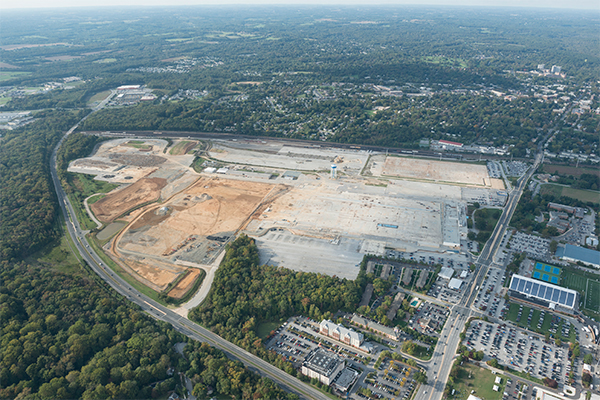
TDC decision
UD terminates Data Centers project for STAR Campus
9:30 a.m., July 10, 2014--The University of Delaware announced today it has terminated its lease agreement with The Data Centers, LLC (TDC), putting a halt to TDC’s plans to develop a data center on the University’s Science, Technology & Advanced Research (STAR) Campus.
Following analysis of TDC’s plans, the UD Working Group concluded that the proposed facility, which included a 279-megawatt cogeneration power plant, is not consistent with a first class science and technology campus and high quality development to which UD is committed. The findings are detailed in the Group’s report. View the report PDF on UD’s website.
Campus Stories
From graduates, faculty
Doctoral hooding
“The University is committed to providing economic development opportunities for the region and state,” says University of Delaware President Patrick T. Harker. “Moreover, it is extremely important that development on the STAR Campus, which is held to the highest standards, is appropriate both for the short and the long term, and that future generations of students will have a top-quality education. We have carefully examined The Data Centers’ plans, and have determined that they are not a good fit for the STAR Campus.”
The Working Group was made up of UD faculty and administrative leaders, who are engaged in STAR Campus projects and have content expertise. After investigating—with the assistance of outside consultants—the overall quality of the facility plans, the size of the power plant and the potential effects of resulting greenhouse gases and other pollutants on the environment, the Group unanimously recommended to University leadership that plans to support such a facility should not be approved on the STAR Campus. That recommendation was endorsed by the provost and executive vice president, and the president concurred.
Among the report’s key findings:
- A data center would be advantageous to the STAR Campus, with the potential to provide research and internship opportunities, enhance the property infrastructure so as to attract other tenants; provide construction and permanent jobs and provide tax revenue for local schools and community.
- Contemporary high quality data centers use the existing grid or deploy a combination of the existing grid and renewable energy generation to meet their power needs. This approach appears to be advantageous on many grounds: reliability, economic and environmental.
- Relative to other fossil-fuel energy sources, the combined heat and power (CHP) facility TDC proposed is an efficient and viable transitional energy generation technology. However, its efficiency is predicated on being appropriately sized such that the recovered heat can be used or sold throughout the year as useful energy. Specifically with TDC’s plan, it was not clear that this would be the case, particularly in the non-summer months.
- The 279-megawatt cogeneration facility that TDC proposed is significantly (at least two times) larger than any other on-site power generation facility known at data centers in the United States.
- Significant generation of greenhouse gases with insufficient plans to capture and sequester carbon dioxide and the emission of other pollutants would have demonstrative and negative effects on UD’s commitments to sustainability and reducing its carbon footprint.
- Given the University’s commitment to reduced carbon emissions, and its strong reputation in renewable and carbon-free energy research, the emplacement of a fossil-fuel based facility of this size does not appear consistent with UD’s vision of a first class science and technology campus or its Path to Prominence.
The University’s decision follows a months-long discussion among faculty, students, environmental groups, neighbors and others about the project.
Harker added, “The University of Delaware values its partnership with the community of Newark and recognizes how important a vibrant and welcoming atmosphere is to our goals and mission and to our students. We have been impressed with the level of passion, input and discussion surrounding this project. This is what makes a college campus exciting—students, faculty and community members are able to freely express themselves.”
The University of Delaware remains committed to developing the STAR Campus to support cutting-edge research, provide educational and professional opportunities for students, foster innovation and create jobs to enrich the community.









